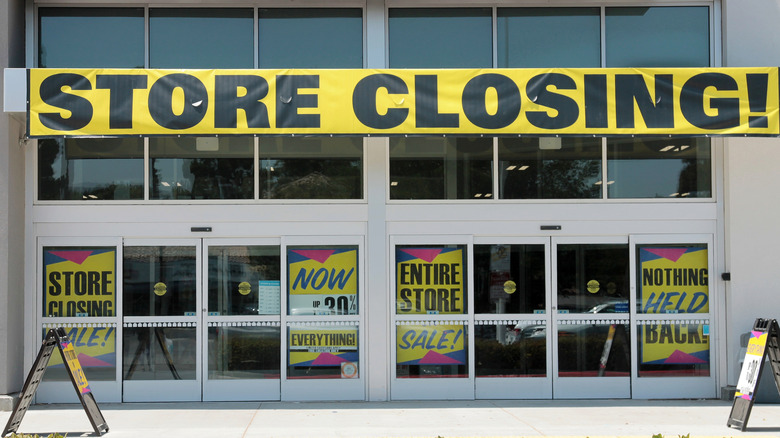9 Tips To Score The Most Affordable Gems When Shopping At Liquidation Stores
Liquidation stores buy returned or discontinued items from retailers and put them out for sale. These thrift store alternatives are usually full of affordable treasures. They buy their products at steep discounts. Then, they turn around and resell them for much less than they'd cost new. However, liquidation stores aren't like big box stores. In exchange for super low prices, you'll have to give up the convenience of being able to find exactly what you want exactly when you want it.
Another option for grabbing huge discounts is liquidation sales. Stores will often have these when they're going out of business or remodeling. These sales are a great chance to get modern furniture and decor that doesn't break the bank.
Although you can score great deals at both liquidation stores and sales, your shopping strategies will differ slightly. You have to keep your eye out for liquidation sales, but liquidation stores are open year-round. And while the stock and inventory at liquidation stores change frequently, the store isn't going out of business.
Whether you're browsing a liquidation sale or hunting for deals at a year-round liquidation store, a little strategy goes a long way. To make sure you walk away with real bargains instead of buyer's remorse, keep these nine smart shopping tips in mind.
Think out of season
You may find seasonal products before a holiday at liquidation stores, but you're more likely to find things that didn't sell during the previous months. Stores will get rid of the stock that doesn't sell after the holiday is over. This is the best time to look for gifts and decorations for next year. In this instance, being organized pays off. Have a plan to store your seasonal decor for a cleaner, clutter-free home and a system for keeping track of what you've bought. Next year, you can go "shopping" in your closet.
Check prices
Price comparisons are the key to getting a good deal on liquidated products. Sale prices aren't guaranteed to be the lowest every time. Also consider what you're buying and how big a purchase it is. If you're buying something you expect to use for many years to come, such as a major appliance, it may not be worth purchasing at a liquidation sale if you're only saving 10%. Instead, you may want to buy from a retailer you know will be there if something goes wrong.
Ask about return policies
Many items that are sold in liquidation sales are non-returnable and non-refundable because the store won't physically be there after it closes. If you buy from a liquidation sale, you should check the manufacturer's warranty before making a large purchase to ensure it will still be valid. Liquidation stores may offer a more liberal return policy, but they frequently sell items as-is and don't offer refunds. However, depending on what you're buying, the manufacturer may offer a warranty. Although you won't be able to return items if you change your mind, you may be able to return a defective item.
Pay attention to timing
Even stores that are going out of business want to make as much money as possible. To maximize their profits, they tend to offer discounts in stages. These sales go on for a limited time, often several weeks. At the beginning of the sale, the discounts are the lowest. As the sale goes on, they'll increase the discount on items that don't sell. In general, if you wait until the end of the sale, you'll score better deals but you'll have less choice. The most popular items probably won't make it until the end.
Check items carefully before buying
To avoid getting stuck with a broken or defective product, make sure you check items carefully before you purchase. Note the expiration dates on all food items. Some items may be safe to eat after the "best by" date, but they may not taste as good. Nonfood items should be carefully checked to be sure there's no damage. If possible, ask if you can test out electrical items before purchasing. An alarm clock that doesn't work isn't a bargain, no matter how low the price is.
Use store gift cards if you have them
If you have a gift card from the store, use it before any other type of payment. Many store gift cards expire after a certain date, or a store may quit accepting them if it's going out of business. In the same vein, use any loyalty or reward points you have. Check the store's policy if you're planning to use loyalty points or coupons for a big discount. Some stores will shut down their reward programs when they go into liquidation.
Use credit cards for extra protection
After you use any store gift cards, your next option for payment should be credit cards. Even if the store doesn't accept returns, many credit cards offer protection if you buy something that doesn't work. Check your credit card company's policy so you'll know what's covered and what isn't. Between credit card policies and manufacturers' warranties, you may not be completely out in the cold if you make an expensive purchase at a liquidation sale and end up with a lemon.
Only buy things you need or want
You aren't saving money if you splurge on an item you wouldn't otherwise purchase. Don't be tempted to buy products just because they're deeply discounted. It's a good idea to make a list of items you'd love to find on liquidation but aren't willing to pay full price for. Then you can sign up for alerts or newsletters such as Retaildive.com. These alerts will notify you of any major retailers that are having liquidation sales.
Go early and late
Because the selection and prices vary so much based on the timing of a liquidation sale, plan to go in the beginning and again at the end. You'll have the best selection early when the sale first starts. This is the time to snag up any items you know will be popular and you definitely want. Go back to the sale at the end to find the deep discounts and great deals that were somehow passed over earlier in the sale.









